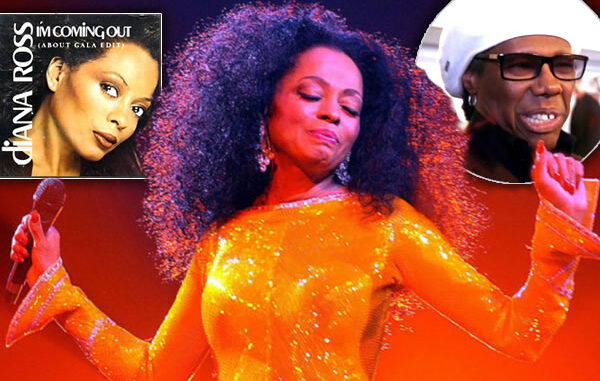
In 1980, Diana Ross, known as the “Queen of Motown,” experienced a significant resurgence in her career, marked by the release of her iconic hit “I’m Coming Out.”

This period was not only pivotal for her music career but also saw her connecting with other music legends like Michael Jackson and Stevie Wonder, and working with innovative producers such as Nile Rodgers and Bernard Edwards from Chic.
The Birth of “I’m Coming Out”
Nile Rodgers, co-founder of the band Chic and a legendary producer, played a crucial role in creating “I’m Coming Out.” The inspiration for the song struck Rodgers unexpectedly. He recounted an experience at GG’s Barnum Room, a predominantly transgender club in midtown Manhattan, where he saw a group of Diana Ross impersonators in the bathroom. This sight sparked an idea, and he immediately called his Chic partner, Bernard Edwards, from a telephone booth. Rodgers urged Edwards to write down the words “I’m coming out,” explaining the situation and envisioning a song that would empower people.
Ross loved the song, drawn to its empowering lyrics, but initially didn’t understand the deeper implications. As Rodgers explained in a 2020 interview with The New York Post, Ross “didn’t understand that that was a gay thing, that that was a person saying, ‘I’m coming out of the closet.’” Nevertheless, the song resonated with her and became an anthem for the LGBTQ+ community, symbolizing liberation and self-expression.
The Resurgence of Diana Ross’s Career
The release of “I’m Coming Out” marked a high point in Diana Ross’s career. Alongside this hit, her song “Upside Down,” also produced by Rodgers and Edwards, soared to the top of the charts. The phrase “Upside Down” came from Ross herself, who expressed a desire to turn her career around. Rodgers and Edwards transformed this sentiment into the catchy lyrics, “Upside down, boy you turn me,” which resonated with audiences worldwide.
Ross’s collaboration with Nile Rodgers and Bernard Edwards not only revitalized her career but also showcased her willingness to explore new musical directions. This period of her career was characterized by innovation and a bold departure from her previous work, aligning with the broader cultural shifts of the 1980s.
The Cultural and Political Landscape of 1980
The resurgence of Diana Ross’s career in 1980 occurred against a backdrop of significant cultural and political events in the United States and the United Kingdom. In the US, popular TV shows like “Dallas,” “The Dukes of Hazzard,” and “Three’s Company” dominated the airwaves, reflecting the diverse tastes of American audiences. In the UK, shows like “Coronation Street” and “Doctor Who” continued to captivate viewers.
Politically, 1980 was a tumultuous year. In the US, the presidential election saw Ronald Reagan defeating incumbent President Jimmy Carter, signalling a shift towards conservative policies. In the UK, Margaret Thatcher’s government faced significant challenges, including economic struggles and social unrest.
Diana Ross’s Connections with Music Legends
During this period, Diana Ross maintained strong connections with other music legends, including Michael Jackson and Stevie Wonder. Her collaborations and friendships with these artists further cemented her status as a musical icon. Michael Jackson, who was at the peak of his career, and Stevie Wonder, known for his groundbreaking work in soul and R&B, both influenced and supported Ross as she navigated her career resurgence.
Nile Rodgers’s Influence and Collaborations
Nile Rodgers’s influence on Diana Ross’s career cannot be overstated. As a co-founder of Chic, Rodgers brought a unique blend of disco, funk, and pop to his productions. His work with Ross on “I’m Coming Out” and “Upside Down” demonstrated his ability to craft hits that resonated with diverse audiences.
Rodgers’s career continued to flourish beyond his work with Ross. He collaborated with numerous artists, including David Bowie on the hit album “Let’s Dance” and later with Bruno Mars and Anderson Paak. Rodgers’s ability to adapt and innovate made him a sought-after producer in the music industry.
The Legacy of “I’m Coming Out”
“I’m Coming Out” remains one of Diana Ross’s most enduring hits. Its significance extends beyond its chart success; it became an anthem for the LGBTQ+ community and a symbol of empowerment. The song’s message of self-expression and liberation resonated with audiences then and continues to inspire new generations.
The collaboration between Diana Ross and Nile Rodgers on “I’m Coming Out” exemplifies the power of music to transcend boundaries and bring people together. Ross’s willingness to embrace new ideas and Rodgers’s innovative production techniques resulted in a song that not only revitalised her career but also left an indelible mark on popular culture.
Capitol fm loves Ms Diana Ross
Diana Ross’s resurgence in 1980, highlighted by the release of “I’m Coming Out,” was a testament to her enduring talent and adaptability. With the help of Nile Rodgers and Bernard Edwards, Ross navigated the evolving musical landscape, producing hits that resonated with audiences worldwide. Her connections with other music legends and the broader cultural and political context of the time further enriched this period of her career. Today, “I’m Coming Out” remains a powerful anthem, celebrating self-expression and empowerment, and cementing Diana Ross’s legacy as a true icon of music.
